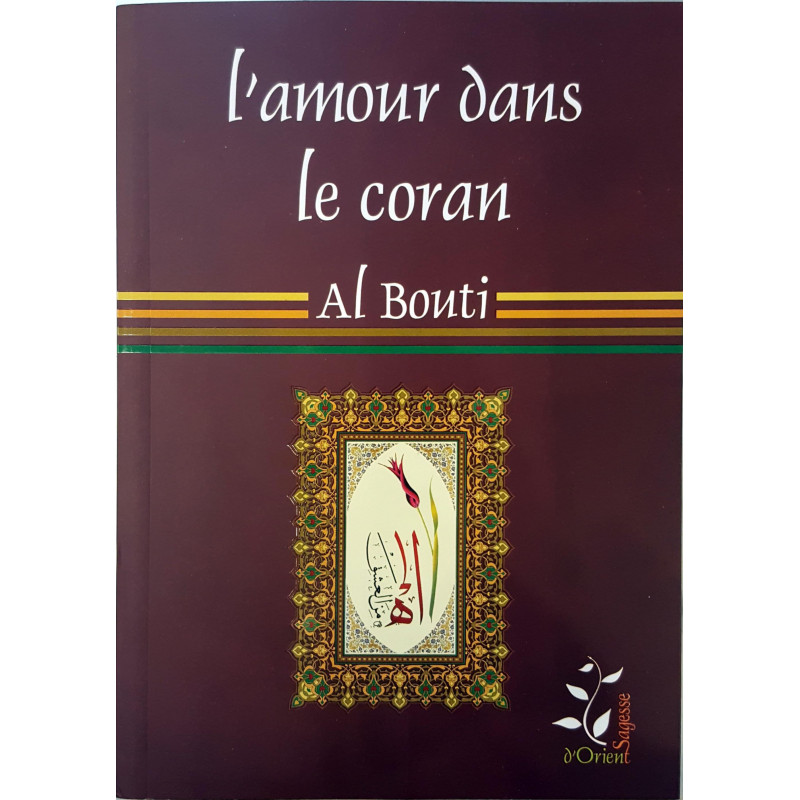



Promotions SANA: Jusqu’à -20%, Cliquez ici
Promotions SANA: Jusqu’à -20%, Cliquez ici
“When the love of God is absent from the heart of man, it will be inhabited by the love of otherness. If a man's heart is filled with divine love a radiance will emanate from that man softening all difficulty around him in this life. »
“Love is strongly present in the Koran because it plays a remarkable role in the life of individuals and societies”
“The Koran addresses the intellectual faculties of man, encouraging him to reflect, as much as he speaks his heart, encouraging him to love. »
“When the love of God is absent from the heart of man, it will be inhabited by the love of otherness. If a man's heart is filled with divine love a radiance will emanate from that man softening all difficulty around him in this life. »
Authors biography :
Muhammad Saîd Ramadân Al-Bûtî, also spelled Al-Boti and Al-Bouti, is a Muslim theologian. He was the head of the Department of Beliefs and Religions of the Faculty of Shari`ah, in Damascus. He preached regularly in the mosques of the Syrian capital, as well as other Syrian cities where hundreds of Muslim men and women came to attend his classes, sermons and conferences. He is the author of more than forty books, many of which have been translated into several languages, including French. He arrived at the 23rd position of the ranking of the 500 most influential Muslims of 2009. Cheikh El-Bouti was assassinated on March 21, 2013 in Damascus.
Mohammed Said Ramadan Al-Bouti was born in 1929 in the village of Jilka on the island of Buthan (from which he takes his name) in Turkey not far from Iraq. He is the son of a mullah imbued with asceticism and piety. At the age of 4, he and his father emigrated to Damascus, where he completed his secondary education at the Islamic Training Institute, to escape the regime of Mustafa Kemal Atatürk. In 1953, he went to study at the University of Al-Azhar, at the Faculty of Islamic Law. There, in 1955, he obtained Al-`Alamiyyah, the highest diploma issued by Al-Azhar at that time. He then studied at the Faculty of Arabic in Al-Azhar, and graduated the same year. In 1960, he taught at the Faculty of Religion at the University of Damascus where he held several hierarchical positions.
Al-Bouti is the author of about forty works dealing with religious sciences, literature, philosophy and sociology. He was the head of the Department of Beliefs and Religions of the Faculty of Shari`ah, in Damascus where his readings brought together hundreds of Muslims every Friday. He had participated in many conferences and symposiums around the world. He occasionally wrote articles for Muslim newspapers and answered questions about Islam and its practice through fatwas published on the Internet8. He had traveled to France many times for conferences and inaugurations of mosques. He was a Fellow of the Royal Society for Research in Islamic Civilization in Amman, Jordan, as well as of the High Council of the University of Oxford in Britain. Al-Bouti was fluent in Turkish, Kurdish and had good knowledge of English.
The writer is particularly appreciated for his methodology and his humility. Al-Bouti is a typical representative of the traditional school of the Middle East, in this he opposes the fundamentalists of Saudi Arabia. A fervent defender of the authority of the 4 schools of jurisprudence (madhhab), he describes their eventual disappearance as "the most dangerous innovation threatening the Sharia". In one of his books, he accuses modern Salafists of manipulating the term "jihad". in their interest, he emphasizes the importance of Islamic jurisprudence (fiqh).His books and essays deal with the foundations of Islam and his reflections on Islamic Civilization in the modern world.He is the author of a series books on the subject of predestination and free will.
In 1994, in his book Jihad in Islam, he opposed Al Albani's controversial fatwa ordering Muslims to leave Palestine.
In 2004, in Strasbourg, he denounced the French law on religious symbols in public schools, which he designated as an attempt to blow up the Muslim family. He surprised his audience by qualifying the Muslim representatives who support this law with the Arabic term "Mounafiquoun" (hypocrites) while the rector of Al-Azhar Mohammed Tantaoui had just given his support to this law in the presence of the French Minister of the Interior. Nicholas Sarkozy.
In October 2010, he wrote a fatwa according to which whoever recognizes Islamic law but cannot apply it is not an apostate but whoever does not recognize it and refuses to apply it is an apostate.
On June 13, 2011, during the crackdown on the Syrian civil war, he published a fatwa prohibiting the military from killing civilians.
Sheikh al Bouti was assassinated on March 21, 2013, during a terrorist suicide attack in the Al-Imane mosque in Damascus, killing 49 other victims, including civilians16. The regime blames the rebels. But the BBC advances another version, which in view of the video casts doubts on the possibility that an explosion which did not damage the table under which the bomb was placed, could have killed 50 people, it also relies on the fact that no trace of a bloodbath was found at the scene of the assassination. As well as the presence of a mysterious man, who just after the explosion, while al Bouti seems to be stunned, approaches him very calmly, holds his head with his left hand and seems to inject or slip him something, and that's when al Bouti's head tilts to the right side, and starts bleeding from the left side and from the mouth. In view of these elements the BBC hypothesizes that the murder could have been perpetrated by the Assad regime.
Data sheet
Specific References
No customer reviews for the moment.